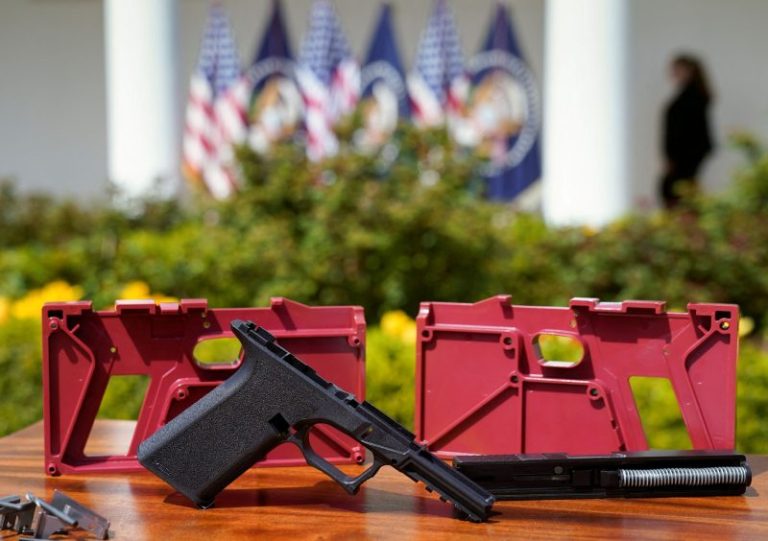The Supreme Court on Monday once again reinstated the Biden administration’s regulations on “ghost guns,” firearms assembled from kits without the usual serial numbers and background checks on purchasers.
The administration’s regulations, which apply to self-made weapons the same kind of licensing and record-keeping required of guns sold commercially, will remain in place while legal battles continue.
There were no noted dissents in the unsigned order, which was necessary because of contrary rulings from lower courts.
In August, the Supreme Court on a 5-4 vote allowed the Biden administration’s regulations to stay in effect. But after the order was issued, U.S. District Judge Reed O’Connor of Texas again stepped in to block the regulations as applied to two manufacturers who supply a large number of the kits sold nationwide. A panel of the U.S. Court of Appeals for the 5th Circuit largely upheld that ruling.
The Biden administration told the Supreme Court the lower courts had “flouted” its August order, and again asked the justices to intervene.
“The district court and the Fifth Circuit have effectively countermanded this Court’s authoritative determination about the status quo that should prevail” while legal challenges continue, Solicitor General Elizabeth B. Prelogar said in a filing. She added: “The Court should not tolerate that affront to basic principles” of judicial review.
In the unsigned, one-paragraph order in August, Chief Justice John G. Roberts Jr. and fellow conservative Justice Amy Coney Barrett joined liberal justices Sonia Sotomayor, Elena Kagan and Ketanji Brown Jackson in approving the government’s plea to reinstate the restrictions.
Conservatives Clarence Thomas, Samuel A. Alito Jr., Neil M. Gorsuch and Brett M. Kavanaugh noted they would have denied the government’s request. Neither side explained its reasoning.
“Ghost guns” are becoming increasingly popular with teenagers and those whose criminal records keep them from buying guns in the marketplace. Ghost gun sales and their use in violent crimes have spiked sharply in recent years, law enforcement agencies say.
The Bureau of Bureau of Alcohol, Tobacco, Firearms and Explosives (ATF) imposed new regulations on the weapons under the Gun Control Act of 1968. Those regulations, Prelogar told the Supreme Court, do not prohibit buying or selling kits to assemble weapons. Instead, they require complying with the same regulations that concern commercial gun sales, such as obtaining licenses, marking products with serial numbers, conducting background checks and keeping records to allow law enforcement to trace firearms used in crimes.
But O’Connor in rulings has said the regulations exceed ATF’s authority. “The liberty interests of law-abiding citizens wishing to engage in historically lawful conduct” — building their own weapons — “outweighs the Government’s competing interest in preventing prohibited persons from unlawfully possessing firearms,” he wrote in one.
The 5th Circuit considered the merits of O’Connor’s ruling at a hearing on Sept. 7, but has not issued a decision.
In the meantime, O’Connor granted a new motion against ATF rules at the behest of two companies, BlackHawk Manufacturing and Defense Distributed, and said they could continue sales. His view was that the Supreme Court’s order covered only his decision to halt the regulations nationwide, and that he could continue to provide relief to individual companies that showed their livelihoods were threatened.
Prelogar said the companies and the lower courts were trying to take advantage of wording in the Supreme Court’s August order to undermine its clear implications.
But in its filing, BlackHawk’s lawyers said the court’s August order was focused on the nationwide implications of ATF’s regulations. “Based upon BlackHawk’s reading of the plain language of the Stay Order, it not only was permitted but was required to return to the district court to seek . . . relief to preserve its ability to stay in business,” the filing said. “Both the district court and the court of appeals agreed. This in no way constituted an affront to basic principles’ ” of judicial review.
The case is Garland v. BlackHawk.

